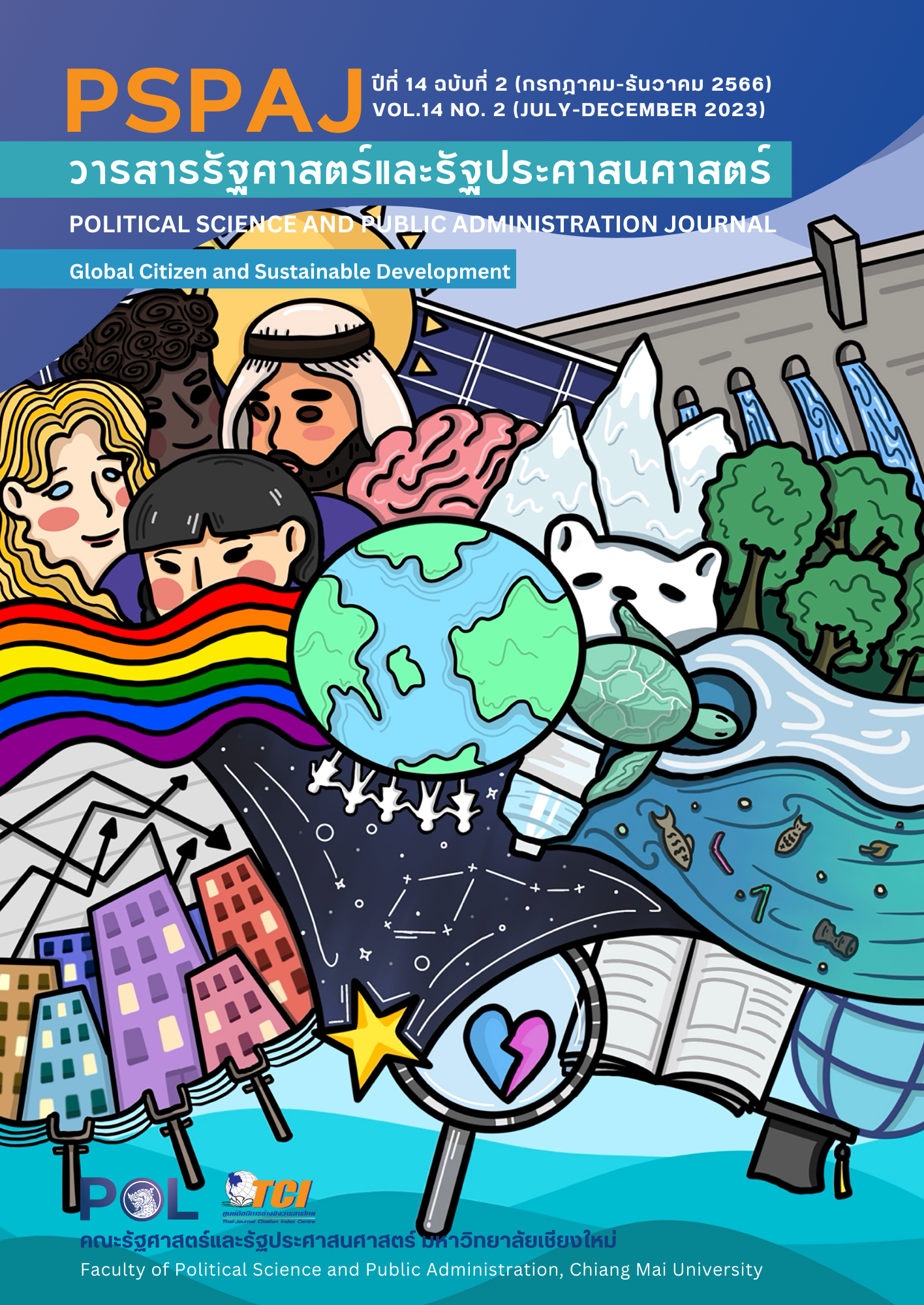Cyber Security Legal Policies for Global Citizens
Main Article Content
Abstract
This article aims to study the legal policies of various countries, which have been enacted to regulate, supervise, control, and protect the cyber security for citizens of the countries and citizens of the world. As the result of the study, it is found that the evolution in the cyberworlds has developed into a cyberculture; countries around the world, including superpowers, European Union countries, the United States of America, China, as well as Thailand, have found a way to solve problems and crimes that occur in the cyberworlds. Measures have been sought to control and regulate in terms of policy, law and other aspects. As for the cyber security legal policy, every country has set cyber security policy as an important main policy. In regard to the law, every country has enacted cyber security laws, and required the establishment of an organization to specifically supervise the cyber security, with similar principles of practice; certain differences lie on the focus on maintaining the security and sovereignty of each country and the method of enforcement, which depends on the administrative and social context of each country. Most of the citizens of Thailand and the world nowadays are involved in the cyberworlds; therefore, one should first study the cyber security legal context of the country where one wants to conduct transactions in the cyberworlds in order to reduce cyber risks.
Downloads
Article Details

This work is licensed under a Creative Commons Attribution-NonCommercial-NoDerivatives 4.0 International License.
- เนื้อหาและข้อมูลที่ลงตีพิมพ์ในวารสารรัฐศาสตร์และรัฐประศาสนศาสตร์ถือเป็นข้อคิดเห็นและความรับผิดชอบของผู้เขียนบทความโดยตรง ซึ่งกองบรรณาธิการวารสารรัฐศาสตร์และรัฐประศาสนศาสตร์ ไม่จำเป็นต้องเห็นด้วย หรือร่วมรับผิดชอบใดๆ
- บทความและข้อมูล ที่ได้รับการตีพิมพ์ในวารสารรัฐศาสตร์และรัฐประศาสนศาสตร์ ถือเป็นลิขสิทธิ์ของวารสาร หากบุคคลหรือหน่วยงานใดต้องการนำข้อมูลไปใช้ประโยชน์ในทางวิชาการ ขอให้อ้างอิงแหล่งที่มาด้วย
References
Thaieurope. (2562). กฎหมายความมั่นคงปลอดภัยทางไซเบอร์ของอียูมีผลใช้บังคับแล้ว. สืบค้นเมื่อ 20 มิถุนายน 2566, จาก https://appdb.tisi.go.th/tis_devs/regulate/eu/pdf/Cybersecurity.pdf
กรมยุโรป กระทรวงการต่างประเทศ. (2564). สหภาพยุโรปเสนอแผนยุทธศาสตร์ด้านความปลอดภัยทางไซเบอร์ เสริมเกราะป้องกันการโจมตีออนไลน์. สืบค้นเมื่อ 26 มิถุนายน 2566, จาก https://europetouch.mfa.go.th/th/content
กระทรวงกลาโหม. (2566). แผนพัฒนาด้านไซเบอร์เพื่อความมั่นคง กระทรวงกลาโหม (พ.ศ. 2566-2570). สืบค้นเมื่อ 20 มิถุนายน 2566, จาก https://dist.mod.go.th/PDF/actplancyber63-65.aspx
กระทรวงดิจิทัลเพื่อเศรษฐกิจและสังคม. (2566). เกี่ยวกับ สกมช. สืบค้นเมื่อ 20 มิถุนายน 2566, จาก https://www.mdes.go.th/mission/detail/2481
คลาร์ก, ริชาร์ด เอ, และคเนค, โรเบิร์ต เค. (2555). สงครามไซเบอร์ [Cyber War] (ไพรัตน์ พงศ์พานิชย์, ผู้แปล). กรุงเทพฯ: มติชน.
ฉัตรพงศ์ ชูแสงนิล. (2561). ยุคแห่งพลเมืองดิจิทัล. สืบค้นเมื่อ 20 มิถุนายน 2566, จาก https://www.scimath.org/article-technology/item/8659-2018-09-11-07-58-08
ไชยสิทธิ์ ตันตยกุล. (2564). กฎหมายว่าด้วยการคุ้มครองข้อมูลส่วนบุคคลของจีน. สืบค้นเมื่อ 20 มิถุนายน 2566, จาก http://www.vijaichina.com/articles/2366
นัทธมน เพชรกล้า, และสุมนทิพย์ จิตสว่าง. (2566). การใช้อำนาจอธิปไตยในโลกไซเบอร์. วารสารสหวิทยาการมนุษยศาสตร์และสังคมศาสตร์, 6(2), 899-914.
ปองกมล สุรัตน์. (2561). การรังแกผ่านโลกไซเบอร์ในมิติสังคมวัฒนธรรม: กรณีศึกษาเยาวชนไทยเจเนอเรชั่น Z (วิทยานิพนธ์ปรัชญาดุษฎีบัณฑิต), สาขาวิชาการวิจัยพฤติกรรมศาสตร์ประยุกต์ บัณฑิตวิทยาลัย มหาวิทยาลัยศรีนครินทรวิโรฒ.
พระราชบัญญัติการรักษาความมั่นคงปลอดภัยไซเบอร์. (2562, 27 พฤษภาคม). ราชกิจจานุเบกษา เล่ม 136 ตอนที่ 69 ก.
ยง ภู่วรวรรณ. (2564). ชีวิตวิถีใหม่ที่เกี่ยวกับดิจิทัล. สืบค้นเมื่อ 20 มิถุนายน 2566, จาก https://learningdq-dc.ku.ac.th/course/?c=1&l=6
สำนักข่าวกรองแห่งชาติ. (2564). สหรัฐฯ ยกระดับมาตรการรักษาความปลอดภัยทางไซเบอร์หน่วยงานด้านการคมนาคม. สืบค้นเมื่อ 20 มิถุนายน 2566, จาก https://www.nia.go.th/cyber/cyberpage/565/
สำนักงานกองทุนสนับสนุนการสร้างเสริมสุขภาพ. (2563). Cyberbully คืออะไร? ส่งผลอย่างไร? และเราควรรับมือกับมันอย่างไรดี?. สืบค้นเมื่อ 20 มิถุนายน 2566, จาก https://resourcecenter.thaihealth.or.th/article/cyberbully.
สำนักงานพัฒนารัฐบาลดิจิทัล. (2563). นโยบายความมั่นคงปลอดภัยสารสนเทศทางไซเบอร์. สืบค้นเมื่อ 20 มิถุนายน 2566, จาก https://www.dga.or.th
เสมอ นิ่มเงิน. (2563). ภัยคุกคามทางไซเบอร์กับกฎหมายไซเบอร์ไทย. สืบค้นเมื่อ 20 มิถุนายน 2566, จาก https://www.prd.go.th/th/file/get/file/2020122193f1c24f1221ab701e6cd1f075693b68110106.pdf
อนุภาค มาตรมูล, และอิศราวุฒิ เอี่ยมวิริยะกุล. (2561). เตรียมพร้อมภาคการเงินเพื่อรับมือภัยทางไซเบอร์. สืบค้นเมื่อ 20 มิถุนายน 2566, จาก https://www.bot.or.th/th/research-and-publications/articles-and-publications/articles/Article_17Oct201.html
อาร์ม ตั้งนิรันดร. (2563). กฎหมายความปลอดภัยทางไซเบอร์กับการกำกับดูแลเศรษฐกิจดิจิทัลของประเทศจีน: ถอดบทเรียนสำหรับเศรษฐกิจดิจิทัลในยุคไทยแลนด์ 4.0. กรุงเทพ: สำนักงานการวิจัยแห่งชาติ (วช.).
Corn, G., & Taylor, R. (2017). Sovereignty in the Age of Cyber. AJIL Unbound, 1(111), 207-212.
Council of Europe. (2001). Convention on Cybercrime. Retrieved June 26, 2023, from https://www.refworld.org/docid/47fdfb202.html
Halder, D., & Jaishankar, K. (2011). Cybercrime and the Victimization of Women: Law, Right and Regulations. Hershey, PA: IGI Global (USA).
Hare, F. (2009). Borders in Cyberspace: Can Sovereignty Adapt to the Challenges of Cyber Security?. Retrieved October 22, 2022, from https://ccdcoe.org/uploads/2018/10/06_HARE_Borders-in-Cyberspace.pdf
Information Office of the State Council the People's Republic of China. (2010). Govt. White Papers – The Internet In China. Retrieved 29 June 2023, form http://www.china.org.cn/government/whitepaper/2010-06/08/content_20208007.htm
Macek, J. (2003). Defining Cyberculture. Retrieved November 31, 2023, from https://www.researchgate.net/publication/268629704_Defining_Cyberculture_Koncept_rane_kyberkultury


